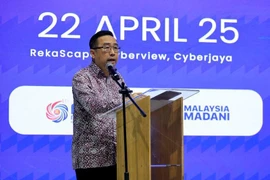Kuala Lumpur (VNA) - Artificial intelligence (AI) is set to significantly reshape Malaysia’s economic landscape, presenting not only challenges but also groundbreaking opportunities for growth, job creation, and innovation, according to an expert.
Georg Chmiel, Co-Founder & Chair of Juwai-IQI, Executive Chairman of Chmiel Global Advisory and board member of World Digital Chamber, cited recent studies as saying that AI has the potential to boost Southeast Asia’s GDP by 1 trillion USD, with Malaysia leading the way in this transformation.
A 2024 report from the Department of Statistics Malaysia (DOSM) estimates that 600,000 workers may lose their old jobs over the course of the next three to five years as AI replaces clerical, administrative, and some manufacturing jobs.
Globally, 85 million jobs are likely to be lost while 97 million new ones are to be created, demonstrating that strategic workforce management and proactive protective reskilling plans are necessary.
In the case of Malaysia, applying AI does not stop at giving advanced machines to do the work but to improve the people that work, in order to create more high-value jobs, Georg Chmiel said, adding that by prioritising AI literacy and comprehensive reskilling initiatives, Malaysia can transform potential disruptions into significant opportunities, ensuring its workforce thrives in the dynamic digital economy.
Chmiel further shared that the next five years are absolutely critical to position Malaysia as a leader in the AI revolution.
Acknowledging the profound impact of AI, the Malaysian government is taking decisive steps to leverage its transformative potential while proactively addressing the challenges posed by job transitions. Minister of Communications and Digital Gobind Singh Deo has declared it a cornerstone of the nation’s economic growth strategy./.

See more

Thailand sends trade proposal to US
Thailand is among the Southeast Asian nations hardest hit by measures introduced by US President Donald Trump, facing a tariff of up to 36% on its exports if a reduction cannot be negotiated before a global moratorium expires in July.

Philippine volcano erupts, spewing ash plume into the sky
Kanlaon Volcano, one of the 24 active volcanoes in the Southeast Asian nation, has had several eruptions in the past century – the most recent of which happened in April.

Former Philippine President Rodrigo Duterte wins mayoral election in Davao
Preliminary results from the Commission on Elections (Comelec) show Duterte leading with approximately 405,000 votes, significantly ahead of his closest rival, who garnered around 49,000 votes.

Malaysia, RoK hold 9th round of FTA negotiations
The latest round of talks for an FTA is scheduled to kick off in Kuala Lumpur for a three-day run, involving some 70 trade officials from the two countries.

ASEAN Secretary-General urges stronger ties with external partners to address global trade challenges
ASEAN Secretary-General Kao Kim Hourn has urged New Zealand and ASEAN to work closely to ensure that shifting trade dynamics do not undermine the rules-based multilateral trading system both sides support.
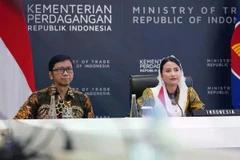
Indonesia committed to promoting ATIGA Upgrade
The upgrade seeks to modernise the the ASEAN Trade in Goods Agreement (ATIGA) framework, making it more facilitative for businesses and responsive to regional and global challenges.
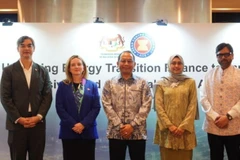
Malaysia pushes for joint ASEAN efforts on green energy financing
A study by the International Renewable Energy Agency estimated that ASEAN will need around 29.4 trillion USD by 2050 to fully transition to renewables and most of which remains unfunded.

Malaysia works hard to expand semiconductor ecosystem
According to Ben Simpfendorfer, head of the consultancy Oliver Wyman Forum, said Malaysia could explore potential areas such as solar panel manufacturing, battery storage systems, and clean energy products.

Thailand, Australia enhance sustainable and stable regional trade
One of significant topics in their discussion was Australia’s New Vehicle Efficiency Standard (NVES), a framework promoting low- and zero-emission vehicles. The standard is effective from January 1, with enforcement beginning on July 1.

Malaysia – EU FTA expected to promote ASEAN – EU ties
The EU hopes that the agreement will replicate the success of the EU-Vietnam FTA, which has helped bilateral trade grow strongly since it came into force in 2020.

Thailand: Covid resurgence ‘no cause for alarm’
From January 1 to May 10, up to 53,676 COVID-19 cases and 16 deaths have been reported in Thailand. Bangkok recorded the most infections with 16,723 cases, peaking during the week of April 27 to May 3 at 14,349 cases, including two deaths.

Malaysia a prime site for nuclear plants: expert
He said locating nuclear power plants in less tectonically active parts of Southeast Asia, such as Malaysia, would be a more logical approach.

Lao ceremony marks Lord Buddha’s 2569th birthday
Phat Tich pagoda in Vientiane, Laos held a ceremony on May 12 morning to celebrate Lord Buddha’s 2569th birthday, drawing monks, nuns, and members of the Vietnamese community in Laos.

Singapore’s gold sales skyrocket during January-April
During January-March period, Singaporeans bought 2.5 tonnes of gold bullion, a 35% increase compared with the same period last year – the biggest year-on-year jump since 2010.
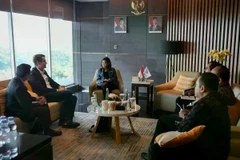
Indonesia accelerates development of 5G ecosystem
Indonesian Minister of Communication and Digital Affairs Meutya Hafid has reaffirmed the government’s strong commitment to building and strengthening the 5G infrastructure and technological ecosystem both nationwide and across the Asia-Pacific region.
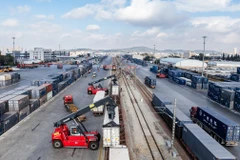
Yunnan (China), ASEAN enjoy steady growth in trade
ASEAN has remained Yunnan's largest trading partner for 20 consecutive years.

Philippines holds midterm elections
About 163,000 police officers have been deployed nationwide to ensure security at polling stations, in coordination with the military, fire brigades and other support units. In addition, the government has extended the early voting period for the elderly and people with disabilities, starting at 5 am on May 12.
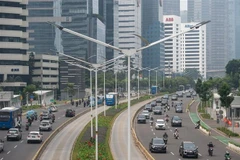
Indonesia’s capital struggles to breathe amid worsening air pollution
Jakarta’s Air Quality Index (AQI) stood at 154, placing the capital in the “unhealthy” category, with fine particulate matter (PM2.5) concentration measured at 59.2 micrograms per cubic metre.

Vietnamese ambassador highlights ASEAN-Brazil cooperation potential
ASEAN currently stands as Brazil's fourth-largest trading partner, reflecting the growing importance of the bloc in the country's international relations and economic strategy.

Thailand aims to reduce workplace accidents
The "Safety Thailand" vision is to cut severe work-related injuries from 2.13 persons at present to no more than one per 1,000 workers, and fatalities from 5.3 to a maximum of three per 100,000 workers by 2030.


